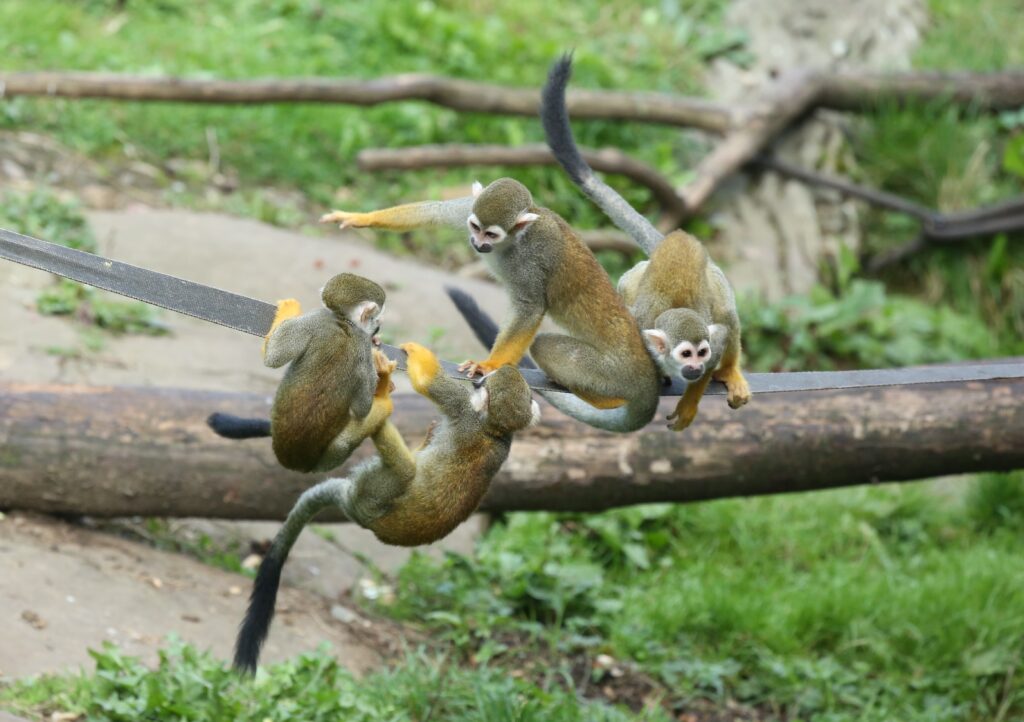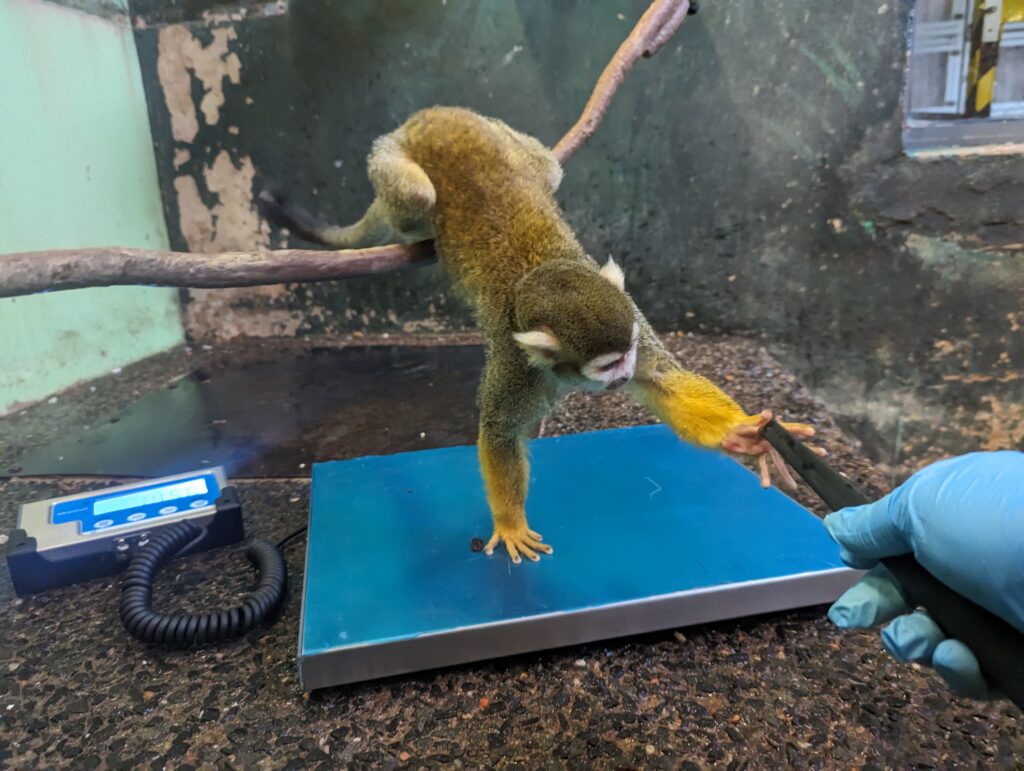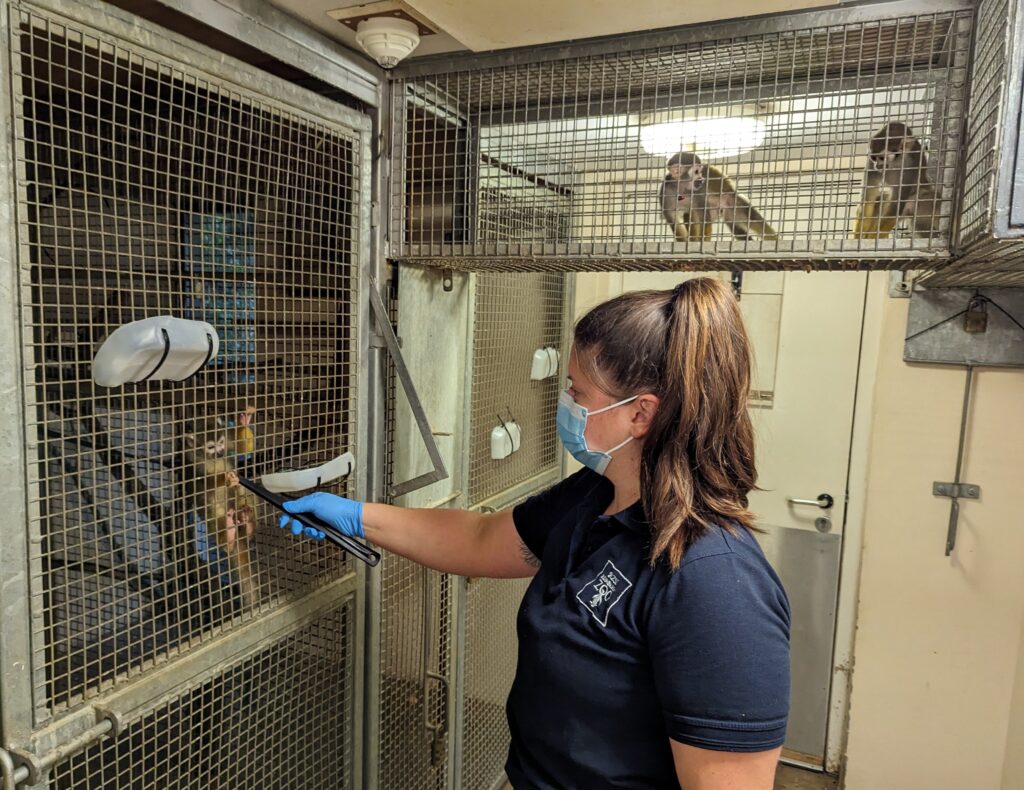Written by Kenna Valles, Keeper, RZSS Edinburgh Zoo
Training in zoos provides several benefits to the animals and keepers. Training helps to keep animals both physically and mentally stimulated, while building a positive relationship between the keepers and animals, increasing the trust and communication between the two and encouraging animals to voluntarily participate in veterinary and husbandry procedures. This both builds the animal’s confidence and reduces their stress levels during these necessary events.

Just like for your pets at home, veterinary procedures in particular can be very stressful for monkeys; they often have to be separated from their group in a smaller area of the enclosure, sometimes physically restrained and handled by the keepers, without an understanding of why. However, to keep our animals healthy, these procedures are necessary to carry out regularly. Specifically training animals for veterinary purposes decreases an animal’s fear towards these procedures, allowing them to cooperate in their veterinary care and associate the procedure with a positive outcome by giving them a reward for participating.
The training performed at Living Links by keepers uses exclusively positive reinforcement techniques. This means that the training is voluntary to participate in and the monkeys are given a valuable reward, such as a food item, for performing a desired behaviour, without any punishment for not performing a behaviour. It is also perfectly acceptable for an animal to choose not to engage in training and their daily routine will continue as normal. Our research activities followed a similar training strategy, with the monkeys developing over the years a strong positive association with our research cubicles, the fun cognitively enriching games, and very tasty food rewards! Monkeys voluntarily come into the cubicles to take part as they find the experience so positively rewarding, and it’s this that keeps them returning each day for research.

The keepers have been training the monkeys to have this positive association with various veterinary procedures, such as voluntarily sitting on a weighing scale to check body weight (one important indicator of overall health) and entering an area of their enclosure called the ‘holding area’ which is used for veterinary checks and procedures.
To encourage the monkeys to start coming into the holding area and build a positive association with it, keepers rewarded each monkey for coming in by giving them a raisin, a highly valued food reward. When the training first started, the “West” monkeys were very nervous coming into the holding area; only around eight monkeys would come in for a raisin and they would then immediately run back out again. However over several training sessions, the monkeys started to become more confident and trusting of coming into the holding area and soon all 16 “West” monkeys were coming in for raisins! They also became more comfortable staying in the holding area for longer periods of time and now most monkeys will stay there eating for several minutes before leaving.

Prior to this training, when the monkeys were closed in the holding area for procedures, they would be visibly stressed and huddle in a large group in a corner. During the annual vaccinations a year ago, only one ‘West’ squirrel monkeys voluntarily entered the holding area, but this year, after all the hard work with training, all 16 monkeys chose to come in by themselves! In addition to this they were not huddled together and instead were wandering around the holding area and continued to come to the keepers for raisins, suggesting they were significantly more comfortable being in the area than previous years. This is a really great success for both keeper and monkeys!
The “East” squirrel monkey group have also been participating in the same training but have a bit more work to do before they reach the same comfort level as the ‘West’ group, but the keepers are confident they will get there! It is still stressful for the monkeys when the actual procedures are carried out (i.e. injections, being weighed) but Kenna and the keeping team hope to work on training them for these procedures as well, and hopefully with enough training, the monkeys (both our squirrel monkeys and our capuchin monkeys) will eventually be comfortable participating in any veterinary procedure.
